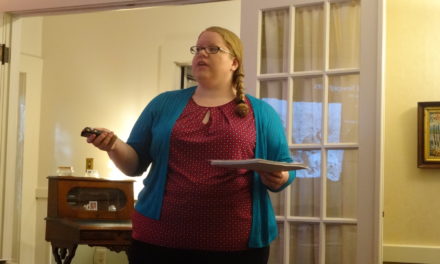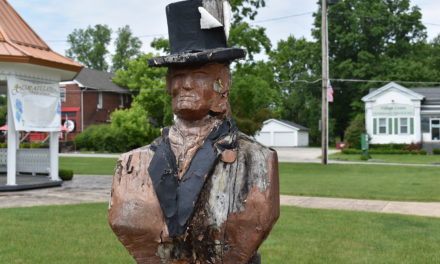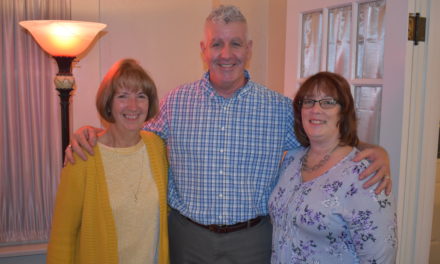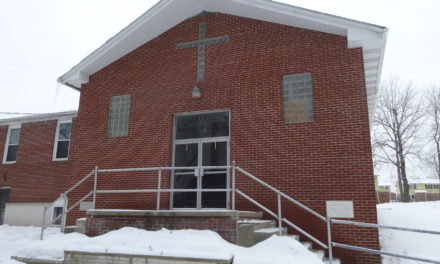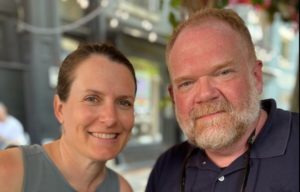
Brian Noble Jones and his wife, Erin Ciarimboli, are shown during a recent trip to New York City. Contributed photo.
It was a gorgeous, late summer day on Sept. 11, 2001, when Brian Noble Jones emerged from his apartment on the lower east side of Manhattan to take the subway to 26 Broadway, where he worked for the former Fleet Bank, in corporate finance, credit and market risk management.
26 Broadway is the former Standard Oil building, the iconic bull statue that symbolizes Wall Street outside its front door.
When he exited the Wall Street station, Jones, a Brookfield native, probably got a coffee and a bagel from a street cart.
“I don’t recall anything being wrong at all,” said the Brookfield High Class of 1993 valedictorian.
But, when he got to his office on the 16th floor, he heard a news report that would begin a day full of
confusion and incomprehension. A local radio station was talking about a plane hitting the World Trade
Center.
“My mind just leapt to that incident, I think it was in 1993, when a small plane hit,” Jones said.
It wasn’t something for the average New Yorker to be concerned about.
“Then, the phone rang,” Jones said. “It was my mom (Linda), excited that I was OK, but wanting to know
what was going on. She told me, and that’s when the two connected. I remember saying, ‘Hold on, I’ll call
you back.’”
26 Broadway has a 16th floor balcony, one from which Jones and his colleagues had watched ticker-tape
parades. It afforded a beautiful view and Jones had taken more than a few visitors there to share the
experience.
From that balcony, he could see smoke coming from the direction of the World Trade Center.
 Then, a plane flew overhead.
Then, a plane flew overhead.
“I swore at the time that it was low enough and slow enough I probably could have hit it with a good pitching wedge,” Jones said.
The plane disappeared from view and he did not see it impact the second World Trade Center tower, which was about an eight-minute walk from his building.
The radio reports had no context.
“It took a long time to get to the ‘it wasn’t an accident’ part,” Jones said.
When he realized that the World Trade Centers had been hit, and not by small, single-engine planes, he
started fearing for colleagues who came to work via the World Trade Center station. He took the elevator
to the ground floor to see if he could see one of his bosses on the street.
“I ended up missing a phone call from him,” Jones said. “He was on the ferry on the way over, and he
ended up turning around and going back to New Jersey.”
“There was speculation and panic,” he said. “What was the matter with the radar system that the FAA was
allowing this to happen? We had no information. We didn’t know anything. It was only after the first
collapse that terrorism came across our mind, that we were under attack. I was still on the 16th floor when
that first one came down.”
At the time, he didn’t know that the tower had collapsed.
“It sounded like a missile or another plane coming in,” Jones said. “The earth shook. It was a horrifying
sound. I remember making the three of them (co-workers) and myself huddle in this kitchenette area that
we had, and get down like it was a tornado drill back in Ohio.”
They learned from the radio that the first tower had collapsed. Jones and two younger colleagues decided
to leave.
“We were in the fire escape and I remember a line of people scrambling down the fire escape, the indoor
stairwell,” Jones said. “I know for certain, right around the sixth floor, the air started getting really bad,
smoke and everything. At some point in time, adrenaline had just spiked in all of us. Everybody’s legs
were cramping up because we were so emotional. We got to the lobby and the windows were pitch black.
That building had big lobby windows on the front of it and you couldn’t see anything. It was as dark as
night.”
One of his co-workers bought water from the convenience store in the lobby, which turned out to be a
good idea.
“He also wanted to buy a disposable camera,” Jones said. “I remember being adamantly against that and
saying, ‘We’re not gonna do that. It’s not the right time.’ Ultimately, the air was hard to breathe. I took off
my dress shirt, cut it up and fashioned masks for us.”
People were congregating in the lobby, but no one knew what to do. Jones said he came up with a plan to
leave through the rear of the building, and head up South Street.
“We thought we could still be under attack,” he said. “We had no new information. I figured they would
try to go for the stock exchange; maybe, the Brooklyn Bridge.”
As they were walking, the second tower collapsed.
“It could have been another plane from the sound of it, the air reverberating,” Jones said.
As they were walking with “masses” of other people, Jones said he tried to tell the others it was OK. “It
was just the second tower collapsing, which seemed so strange. In our minds, you’re not thinking about
anybody being in there. You assume that they fully evacuated. Momentarily thereafter, the debris field hit
us. I remember small building parts falling around us, paper galore. I think we took shelter underneath an
alcove or an awning or an entryway. It wasn’t big stuff, but you didn’t want to be hit by it. The smoke got
crazy thick, again. It was definitely hard to breathe. Eyes were bad.”
They got to a fish market and a fishmonger was outside with a water hose. “That was a blessing,” Jones
said, “because you could spray off your face and your head and get rid of the stuff that was there.”
“We got to the Brooklyn Bridge and that was the demarcation line. The way the wind was taking the
smoke, it was heading east, northeast a little bit. You got on the other side of the Brooklyn Bridge, it was
just the gorgeous day it had been to start. You were out of the smoke. That was the first vantage point that
we had that we could turn around and see that the buildings were gone. It was just the two towers of
smoke and debris. Maybe that’s where it really first hit in, the enormity of it. It was just shock until that
point in time.”
The trio walked to Jones’ apartment. You couldn’t call anyone within New York, but he could call family
members who lived elsewhere, and he was able to get word to his cousin, whom he lived with, but
who was not home, that he was OK.
They decided to donate blood and walked to a hospital in the West Village, but people were being turned
away “because there wasn’t a need for it. They weren’t recovering survivors.”
Jones returned to his office about a week later.
“None of the technology worked and it smelled,” he said. “It was acrid down there.”
He stayed just long enough to pick up some belongings.
“There was no point in being there,” he said.
That evolved into his opinion of New York in general. Unable to work – the internet wasn’t the thing it is
now at that time, and there was no working from home for the kind of job he had – he had plenty of time
to think.
“I took a couple of weeks and just reflected,” Jones said. “This was when I got to really take stock and
evaluate who I was, what I wanted to be doing. This career path had afforded me the opportunity to live in
New York City and to live well, but it wasn’t really fulfilling me. With 9/11, I had the realization that it
doesn’t matter what you earn. You can’t take it with you. If you’re not happy on a day-to-day basis, there’s
no point in doing it.”
Fleet Bank – which has since become part of Bank of America – offered to transfer him anywhere it had
an office, but Jones resigned, and moved back to Ohio. He worked at a restaurant, in construction, as a
Gambier Village councilman, and then got into college admissions. He currently is associate dean of
admission at Wesleyan University in Middletown, Conn.
Twenty years after the terrorist attacks, Jones still is trying to process that day. He did not lose anyone he
knew in the attacks, but many people he knew lost family members and friends. Although he was briefly
swallowed up by the debris of the second tower collapse, he has no ongoing health issues that he can trace
to that day.
“It doesn’t seem like I’m connected to that place and that space and that time,” Jones said. “Yes, it was a
horrific, traumatic event – felt as though we were under attack and at war – but, I survived. I don’t have
any marks to show for it. I think there’s some guilt deep down about that.”
Jones has been back to New York three times, twice for quick business meetings, and once this summer
for a longer stay.
“I stayed at the Marriott property right adjacent to the World Trade Center site,” he said. “That was hard.”
He visited the site of the World Trade Center, but did not enter any of the museums.
“I don’t think I can do that, think I’m ready for that,” he said. “The reflection pools, that was plenty
enough. That was really all I wanted to see, or felt like I could see.”
“I do think that’s important that we don’t forget the people. When I really get into the details, it does arise
all of these still-raw emotions I probably, in a larger sense, haven’t dealt with.”

